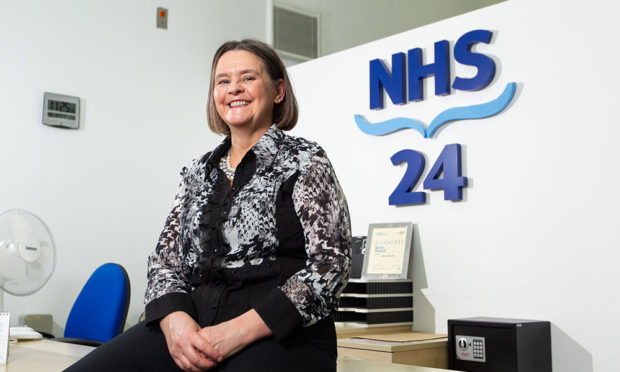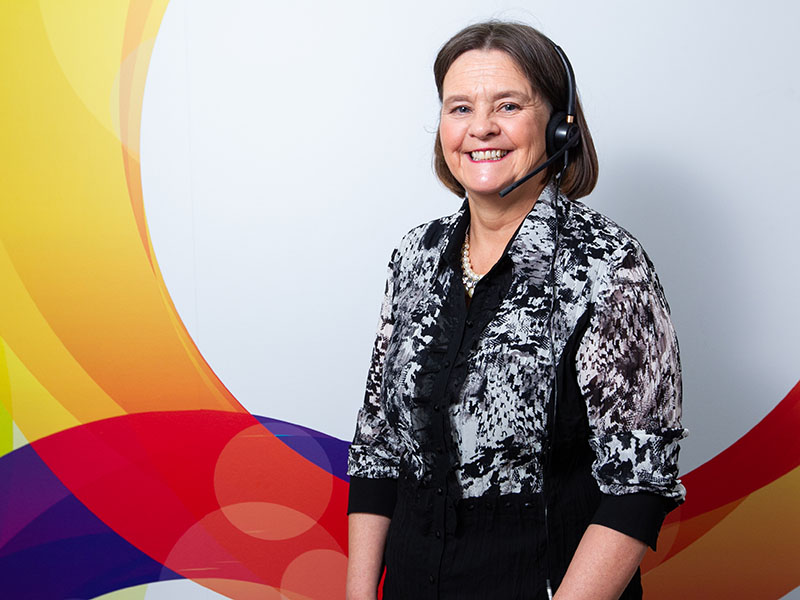
With three decades of experience, pharmacist Margaret McGee is perfectly placed to offer advice to callers on NHS 24’s out-of-hours service – and is gearing up for one of the busiest times of the year.
Along with the festive season, the Easter holiday weekend is a time when the number of calls coming into this vital helpline escalates as GP surgeries and local pharmacies change their opening hours.
Fortunately, NHS 24 is more than ready for the demand, and has experts like Margaret on hand at the end of the phone to assist patients. Margaret is the service’s Regional Pharmacist for the west of Scotland and works out of the organisation’s headquarters in Cardonald on Glasgow’s south side.
She explained: “NHS 24 pharmacists are part of the team in NHS 24 111 service. We can give the same self-care advice, triage patients and help with minor ailments like coughs, colds and diarrhoea that a community pharmacist can.
“At NHS 24 we take calls from people from all walks of life, and many of these calls are from people who are on medication but have perhaps taken an extra dose or missed one, so they call NHS 24 for advice.
“Others call as they may be experiencing side effects of the medication and they are worried about it. Often at the end of the call, after discussion, we allay any fears they may have.
“Because the general public are not trained in clinical matters, they do worry about medication. Often people think twice about phoning us in case we are too busy, especially older people. But we want to say that NHS 24 is here to help and advise you. We are the right people to call about such questions.”
Each enquiry goes through a system to assess who best can meet the needs of the caller after a call handler has captured initial details. For example, NHS 24 calls can be transferred to a pharmacist, nurse or dental nurse.
Margaret, who heads up the pharmacy support line is full of praise for NHS 24’s call handlers, some of whom are retired police officers, and she recognises that they are highly skilled individuals who are very experienced and engaging with patients.
As well as taking calls, Margaret also offers support to her nursing colleagues from a pharmacist’s point of view, something she particularly enjoys doing.
NHS 24 is busiest when GP practices are closed and typically there is a surge in calls over public holidays. But while the reasons for calling will vary, one thing remains a constant, and that is how each call is dealt with.
Margaret says: “Every single call we receive is taken with dignity and respect, you will be treated with the best possible care.
“Although we cannot see the patient, we can sometimes tell by their tone of voice how they may be feeling. I once spoke to a lady who called NHS 24 as she was needing advice about her medication, but when I spoke to her and asked how she was feeling, it became clear to me that she needed the input of my nursing colleagues and I was able to arrange that for her there and then.”
It’s no surprise that Margaret has become a pharmacist, as she is the third generation of her family to work in this industry – her grandfather and father were pharmacists, as are her brothers.
This year Margaret celebrates 30 years since she qualified. In this time she has gained experience working in the pharmaceutical industry, as well as stints at the Royal Hospital for Children in Glasgow, John Radcliffe Hospital in Oxford, and the Golden Jubilee National Hospital in Clydebank.
Now, three years into her role at NHS 24, the pharmacist has gained her prescribing qualification and is working with the team to see how prescribing can enable care for people.
Margaret added: “NHS 24 is an amazing place to work. There is a great buzz about the place – I absolutely love my job.”
*For trusted health and care information, a service directory and self-help guides, visit: www.nhsinform.scot
Pharmacist’s guide on how to be prepared for any Easter emergencies
If you have a question regarding medicines over the Easter period, here is Margaret’s advice:
“Your local pharmacist is a great place to start if you have questions about medicines or how to manage common symptoms like colds, sore throats and tummy upset. If you run out of your usual prescribed medicine you can go to any community pharmacy and explain what has happened. Take proof that you are on a particular medication, for example, your repeat prescription or the empty packet, as this makes sure the pharmacist knows exactly what medicine you are looking for.
“In most cases pharmacists will be able to help out with a supply of what you need. If pharmacies are closed on Good Friday and Easter Monday, that’s when patients should call us for advice.
“We also have the facility to look up which community pharmacies are open near you. nhsinform.scot is a really good resource available to all anytime and anywhere with useful advice online and self-help guides.”

MEDICINE CABINET ESSENTIALS
Pharmacist explains what it in a well-stocked medicine cupboard:
Prescriptions
If you receive regular prescriptions, make sure you have enough medication to take you through Easter until your GP surgery opens again.
Pain relief
Stock up on painkillers such as paracetamol and ibuprofen which will help to lower your temperature too if you have a fever. Have supplies in the correct format, e.g. liquid for children.
Stomach settlers
Tummy ailments such as diarrhoea, constipation and indigestion are common so keep a supply of over-the counter medicines to help with those symptoms.
First aid kit
It’s always a good idea to keep a basic first aid kit at home to treat minor cuts, bruises and burns. Antiseptic cream or wipes, multi-sized plasters, bandage, gauze and tape should be top of the shopping list.
Children’s medicines
Kids require different dosages to adults so make sure you have junior versions of essential medicines such as painkillers and cough mixtures to give them if they’re unwell.
Antihistamines
Often used to treat allergic reactions or conditions such as rashes, antihistamines are a good thing to keep at home to help provide relief from milder symptoms.

Enjoy the convenience of having The Sunday Post delivered as a digital ePaper straight to your smartphone, tablet or computer.
Subscribe for only £5.49 a month and enjoy all the benefits of the printed paper as a digital replica.
Subscribe